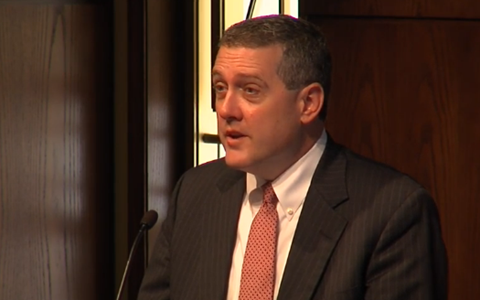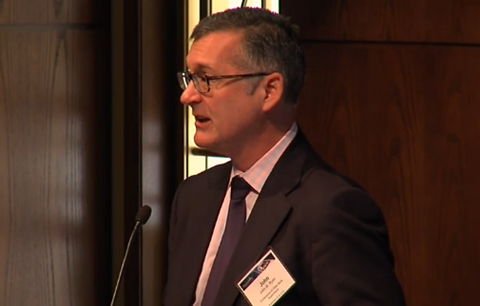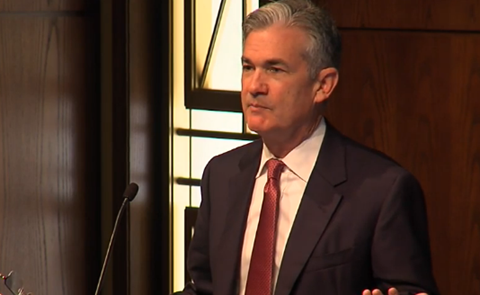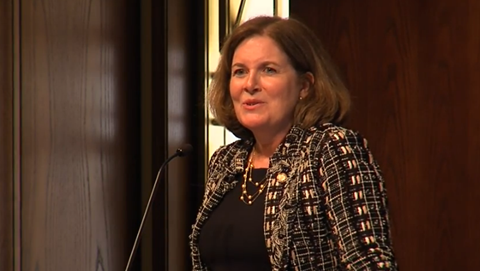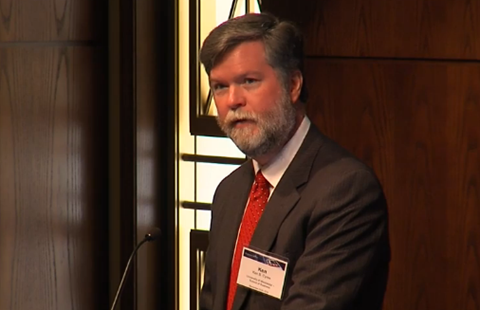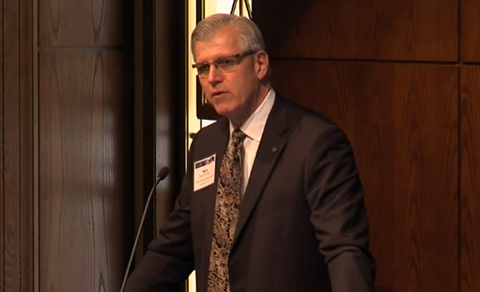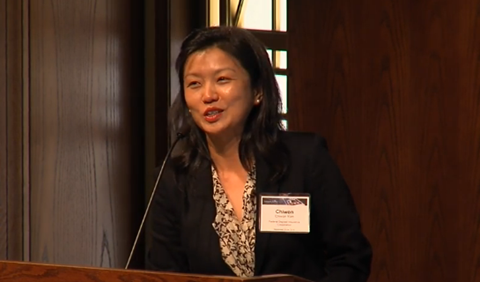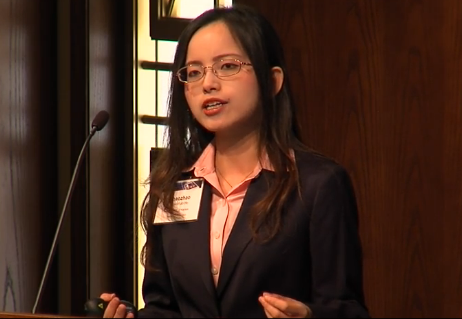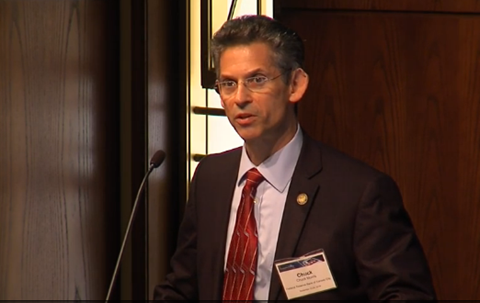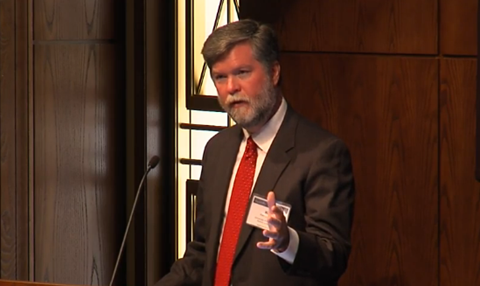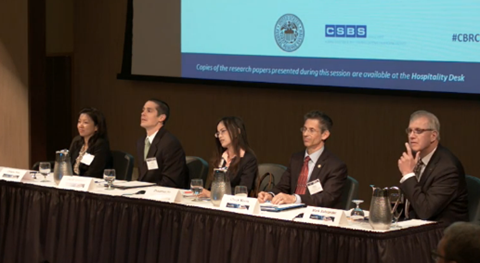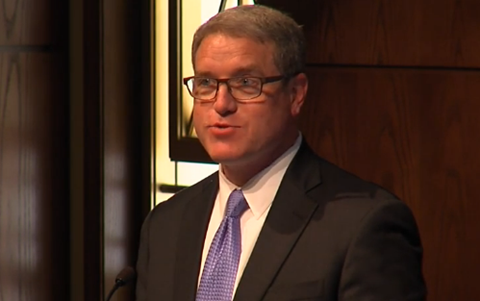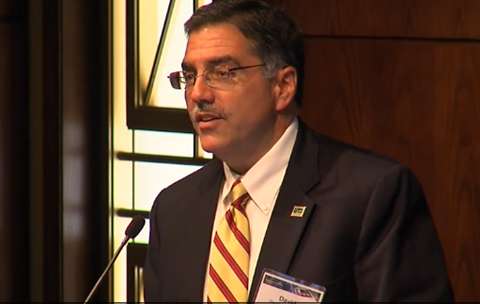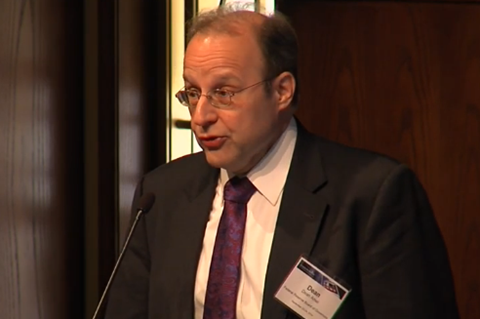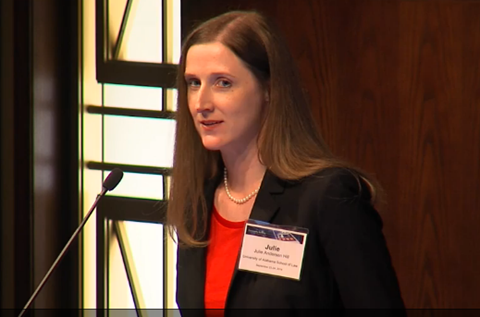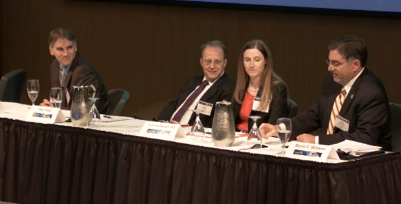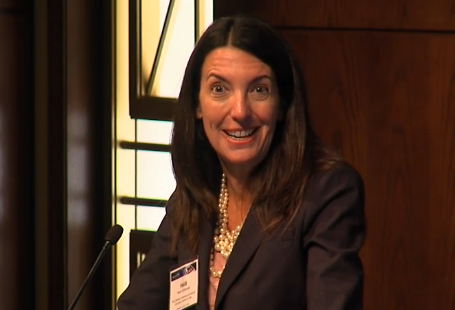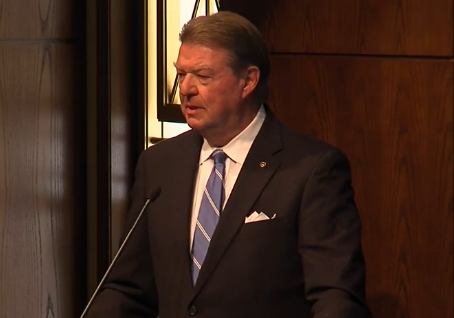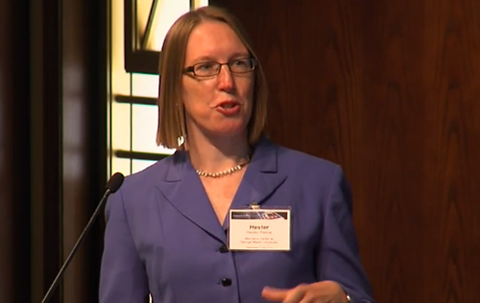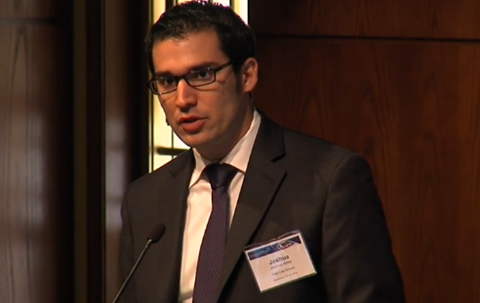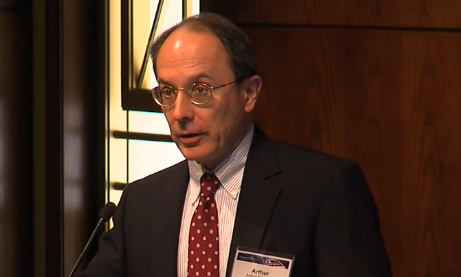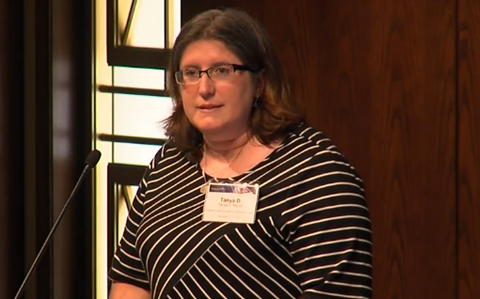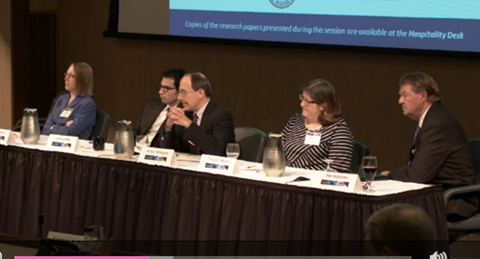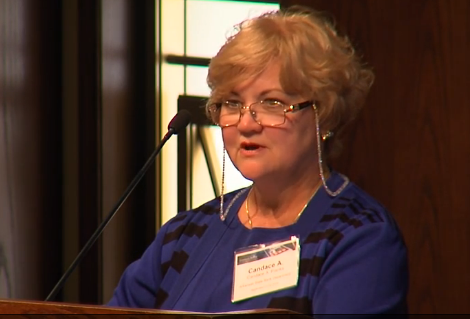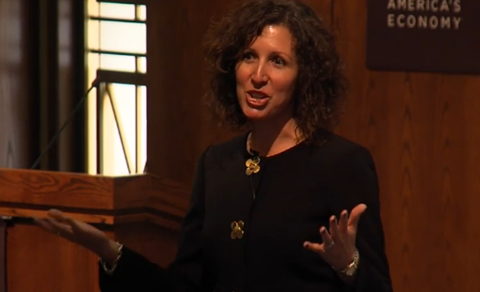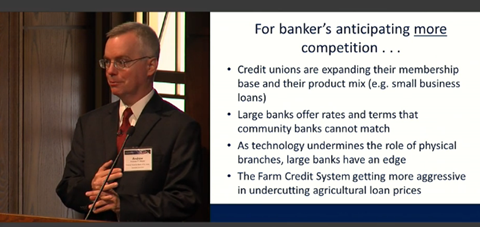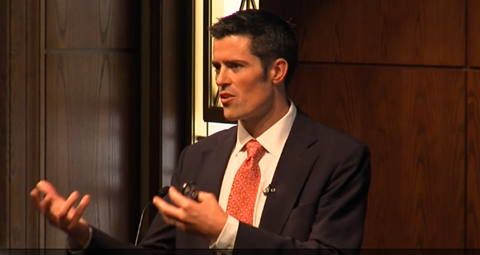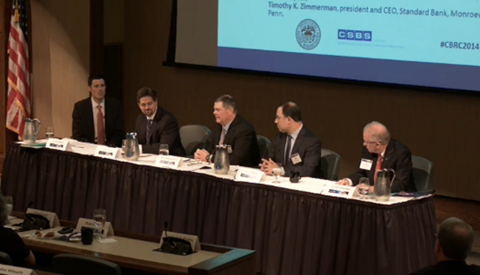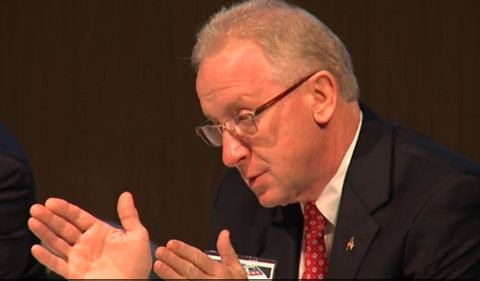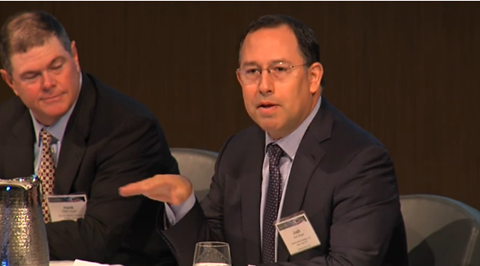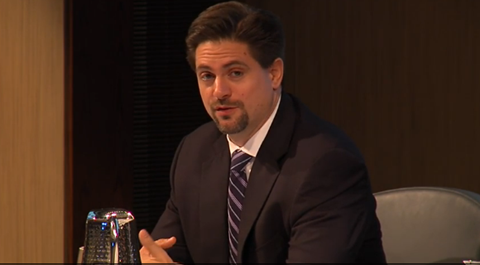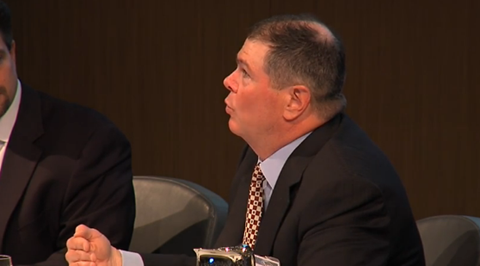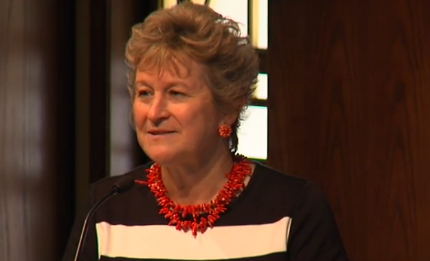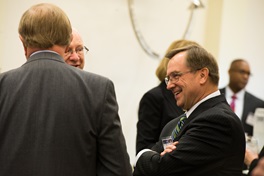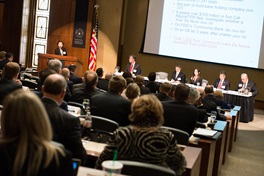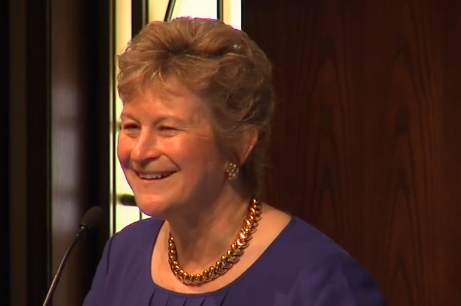
Community Banking in the 21st Century
The second annual Federal Reserve System/ Conference of State Bank Supervisors Community Banking in the 21st Century Research and Policy Conference took place September 23-24, 2014 at the Federal Reserve Bank of St. Louis. The research conference will brought together community bankers, academics, policymakers, and bank regulators to discuss the latest research on community banking.
The Federal Reserve/CSBS research conference presents an innovative approach to the study of community banks. Academics explore issues raised by the industry in a neutral, empirical manner and present their findings at the conference. Community bankers contribute through participation on discussion panels and feedback to the research presented, by contributing to an annual national survey, and by serving as keynote speakers at the conference.
Federal Reserve Governor Jay Powell gave opening remarks at the second annual conference. Other guest speakers included CSBS President and CEO John Ryan and Federal Reserve Bank of St. Louis President James Bullard.
The call for papers for this year's conference opened Feb 2, 2014.
For more information, please contact conference@communitybanking.org.
Conference Agenda
Gateway Auditorium, 6th Floor | Federal Reserve Bank of St. Louis
September 23-24, 2014
- Tuesday, September 23
-
Agenda Item
-
Morning Keynote Address
-
Break
-
Research Paper Session 1
 Moderator: Ken Cyree
Moderator: Ken Cyree
Dean, University of Mississippi School of Business Administration; Director, Mississippi School of Banking
PanelistsThe Entry, Performance and Viability of De Novo BanksYan Lee and Chiwon Yom Federal Deposit Insurance CorporationWhere Are All The New Banks? The Role of Regulatory Burden in New Charter CreationRobert M. Adams and Jacob Gramlich, Federal Reserve Board of GovernorsRivalry, Market Structure and Innovation: The Case of Mobile BankingZhaozhao He, University of KansasWhat Explains Low Net Interest Income at Community Banks?Chuck Morris and Kristen Regehr, Federal Reserve Bank of Kansas CityModerator Reaction- Ken CyreeModerated Question and Answer Session -
Lunch
-
Research Paper Session 2
PanelistsAssessing Targeted Macroprudential Financial Regulation: The Case of the 2006 Commercial Real Estate Guidance for BanksWilliam F. Bassett and W. Blake Marsh, Federal Reserve Board of GovernorsThe Impact of the Small Business Lending Fund on Community Bank Lending to Small BusinessesDean Amel and Traci Mach, Federal Reserve Board of GovernorsWhen Bank Examiners Get It Wrong: Financial Institution Appeals of Material Supervisory DeterminationsJulie Andersen Hill, University of Alabama School of LawModerated Question and Answer Session -
Break
-
Research Paper Session 3
 Moderator: Heidi Schooner
Moderator: Heidi Schooner
, Columbus School of Law, Catholic University of America, Washington, D.C.
PanelistsHow are Small Banks Faring Under Dodd-Frank?Hester Peirce, Ian Robinson, Thomas Stratmann
Mercatus Center, George Mason UniversityDid the JOBS Act Benefit Community Banks? A Regression Discontinuity StudyJoshua Mitts, Columbia Law SchoolA Tiered System of Regulation is Needed To Preserve the Viability of Community Banks and Reduce the Risks of MegabanksArthur. E. Wilmarth, Jr., George Washington University Law SchoolFederal Policy, Market Failures and the Challenge for Community BanksTanya D. Marsh, Wake Forest University School of LawModerated Question and Answer Session -
Reception and Dinner
-
Evening Keynote Address
- Wednesday, September 24
-
2014 Community Banker Town Hall Survey Presentation of Results
-
Break
-
Panel Discussion: The Future of Community Banking
 Moderator: Lamont Black
Moderator: Lamont Black
Associate Professor of Finance, Driehaus College of Business, DePaul University Chicago, Illinois
Panelists R. H. Hank Seale, III
R. H. Hank Seale, III
Founder and Chairman, Q2; Founder and Chairman, CBANC Network, Austin, Texas, Q2; CBANC Network, Austin, Texas
 Joshua Seigel
Joshua Seigel
Managing Partner and Chief Executive Officer, StoneCastle Partners, LLC, New York, N.Y.
-
Conference Wrap-up
-
1200 - Lunch and Adjourn
Research Papers, Authors and Key Findings
Research Paper Session 1
The Entry, Performance and Viability of De Novo Banks
Authors: Yan Lee, Federal Deposit Insurance Corporation (FDIC); Chiwon Yom, Federal Deposit Insurance Corp.- FDIC
Abstract: De novos are of interest as they represent the beginning of a community bank’s life cycle. From 2000 to 2008, 1,042 new banks were chartered, mostly in large, rapidly growing regions, with incumbent banks focused on construction and development (C&D) lending. Compared to small established banks, de novos failed at higher rates and were acquired at lower rates during the recent financial crisis. De novo banks that failed tend to have lower equity, lower earnings, higher non-performing loans, higher reliance on noncore funds, and higher concentration in C&D loans.
Where Are All The New Banks? The Role of Regulatory Burden in New Charter Creation
Authors: Robert Adams, Board of Governors of the Federal Reserve System; Jacob Gramlich, Board of Governors of the Federal Reserve System
Abstract:
The number of new bank charters in the United States has declined dramatically in recent years. From 1990 to 2008, 1,850 new banks were formed, a rate of nearly 100 per year. From 2010 to 2012 only 5 new banks were formed, a rate of fewer than 2 per year. The cause of the decline is not immediately obvious, but two leading theories – with rather different policy implications – have been put forward. Some have suggested that the decline is due to increased regulatory burden on banks – including new FDIC regulations and the 2010 Dodd Frank Act. Others have suggested that the weak economy – with its associated weak demand for banking services and low interest rate environment – are depressing bank profits. The former case may be of more concern to policymakers than the latter. This paper assesses the causes of the drop in new charter creation. We model firms’ new charter decisions at the county level with an ordered prohibit using U.S. data from 1995 to 2012. The results suggest that a substantial portion (perhaps up to 90%) of the decline in new bank formation is attributable to the low interest rate environment and weak demand for banking services. This suggests a rather small role for the effects of increased regulatory burden on banks. It is less clear whether regulation will play a role when the economy returns to more robust state.
Rivalry, Market Structure and Innovation: The Case of Mobile Banking
Author: Zhaozhao He, University of Kansas
Abstract:
This paper focuses on a novel phenomenon—mobile banking diffusion—to analyze innovative behavior in the U.S. modern banking era. Using a unique, hand-collected dataset of mobile banking app adoption for 2008-2012, this study shows strong evidence that rivalry adoptions spur technological innovation. This effect increases monotonically with the degree of market concentration, and is the strongest in most concentrated markets, where banks compete on non-price attributes. These results are robust to the application of instrumental variables that address the possibility that adoptions are merely simultaneous reactions to the same common forces. Finally, the impact of mobile app adoption on bank performance is also examined.
What Explains Low Net Interest Income at Community Banks
Authors: Charles Morris, Federal Reserve Bank of Kansas City; Kristen Regehr, Federal Reserve Bank of Kansas City
Abstract:
Community bank performance has improved significantly since the financial crisis but is still below pre-crisis levels. One key concern is net interest income, which rose early in the recovery but now is near a 40-year low. Net interest income is important to the long-term viability of community banks because it is their core source of revenue. Given community banks’ significance to local households and businesses, policymakers, bankers, and other stakeholders would like to know whether low net interest income is the “new normal” or if it will reverse when the economy improves.
This article examines the historical behavior of net interest income for community banks, focusing on how it compares in the current recovery to four previous recoveries starting in the mid-1970s. The data show low interest rates, a flat yield curve, and a decline in lending are important reasons why net interest income still has not recovered. In fact, compared to the recoveries from the relatively severe 1973-75 and 1981-82 recessions, net interest income is somewhat stronger this far into the recovery. Thus, as monetary policy normalizes and the economy recovers, community bank net interest income should be expected to rise toward pre-recession levels.
Moderator Reaction- Ken Cyree
Moderated Question and Answer Session
Research Paper Session 2
Assessing Targeted Macroprudential Financial Regulation: The Case of the 2006 Commercial Real Estate Guidance for Banks
Authors: William Bassett, Board of Governors of the Federal Reserve System; W. Blake Marsh, Federal Reserve Bank of Kansas City
Abstract:
In the mid-2000s, federal bank regulatory agencies became alarmed by steadily increasing concentrations of commercial real estate (CRE) loans at many banks, particularly loans used to finance construction and land development (CLD). In January 2006, they issued guidance that required banks with specific high concentrations in those asset classes to tighten managerial controls. This paper shows that banks with concentrations in excess of the thresholds set in the guidance subsequently experienced slower growth in their CRE and CLD portfolios than can be explained by changes in the health of their balance sheets and economic conditions. Moreover, banks that were above the CRE thresholds also tended to have slower growth in C&I loans but faster growth in loans to households after the guidance was issued. The results highlight the potential for this type of macroprudential regulation to have a significant and broad influence on bank behavior.
The Impact of the Small Business Lending Fund on Community Bank Lending to Small Businesses
Authors: Traci Mach, Board of Governors of the Federal Reserve System; Dean Amel, Board of Governors of the Federal Reserve System
Abstract:
Following the financial crisis, total outstanding loans to businesses by commercial banks dropped off substantially. Large loans outstanding began to rebound by the third quarter of 2010 and essentially returned to their previous growth trajectory while small loans outstanding continued to decline. Furthermore, much of the drop in small business loans outstanding was evident at community banks. To address this perceived lack of supply of credit to small businesses, the Small Business Lending Fund (SBLF) was created as part of the 2010 Small Business Jobs Act. The fund was intended to provide community banks with low‐cost funding that they could then lend to their small business customers. As of December 31, 2013, the U.S. Department of the Treasury reports that SBLF participants had increased their small business lending by $12.5 billion over their baseline numbers. The current paper uses Call Report data from community banks and thrift institutions to look at the impact of receiving funds from SBLF on their small business lending. The analysis controls for economic and demographic conditions, market structure and competition. Simple regression estimates indicate that participants in the SBLF program increased their small business lending by about 10 percent more than their non‐participating counterparts, in line with numbers reported by Treasury. However, estimates that control for the ongoing growth path in small business lending indicate no significant impact of SBLF participation on small business lending.
When Bank Examiners Get It Wrong: Financial Institution Appeals of Material Supervisory Determinations
Author: Julie Hill, University of Alabama School of Law
Abstract: Banks and credit unions sometimes complain that the examination process regulators use to police banking practices is oppressive. These financial institutions complain that regulators reach unduly negative examination conclusions known as "material supervisory determinations." Institutions are wary because negative determinations can subject an institution to further regulatory scrutiny or enforcement actions. To guard against erroneous determinations, Congress, in 1994, enacted a statute requiring federal financial institution regulators to provide an appeals process. Each of the four regulators (the Office of the Comptroller of the Currency, the Federal Deposit Insurance Corporation, the Federal Reserve, and the National Credit Union Administration) adopted unique material supervisory determination appeals processes. Using data (some collected through Freedom of Information Act requests) about material supervisory decision appeals since 1994 and interviews with top regulators, this Article provides the first in-depth analysis of the appeals process. It shows that the appeals process is sometimes dysfunctional and seldom used. To improve the appeals process, the Article recommends three changes. First, once a regulator issues a material supervisory determination, financial institutions should have direct access to a dedicated appellate authority outside of the examination function. Second, the appellate authority should engage in a robust review process; it should consider a broad scope of appealable matters and employ a clear and rigorous standard of review. Third, regulators should release detailed information about each decision reached by the appellate authority.
Moderated Question and Answer Session
Research Paper Session 3
How Are Small Banks Faring Under Dodd-Frank?
Authors: Thomas Stratmann, Mercatus Center, George Mason University; Hester Peirce, Mercatus Center, George Mason University; Ian Robinson, Mercatus Center, George Mason University
Abstract:
This paper presents the results of the Mercatus Center’s Small Bank Survey, which include responses from approximately 200 banks across 41 states with less than $10 billion in assets each, serving mostly rural and small metropolitan markets. The initial analysis suggests that Dodd- Frank significantly affects small banks and their customers. A large majority of respondents viewed Dodd-Frank as more burdensome than the Bank Secrecy Act, and the participating banks reported substantially increased compliance costs in the wake of new regulations. These costs include hiring new compliance personnel, increased reliance on outside compliance experts, additional resources allocated to compliance, and more time spent by noncompliance employees on compliance. The increased regulatory burdens have led small banks to reconsider their product and service offerings, including considering whether to stop providing residential mortgages. Many small bank customers, who will have difficulty locating convenient alternatives, will feel the indirect effects of Dodd-Frank.
Did the JOBS Act Benefit Community Banks? A Regression Discontinuity Study
Author: Joshua Mitts, Columbia Law School
Abstract:
This study examines the effect of section 601(a)(2) of the Jumpstart Our Small Business (JOBS) Act of 2012, which modified the threshold for unlisted banks and bank holding companies (BHCs) to deregister under the Securities Exchange Act of 1934 from 300 to 1,200 shareholders of record. This change in the cutoff permits utilizing the quasi-experimental technique of regression discontinuity to identify the causal effect of Exchange Act deregistration on the performance of banks and BHCs that took advantage of the statutory change. Using an original dataset consisting of 187 community banks and a novel application of comparative interrupted time series analysis to regression discontinuity, I estimate the local average treatment effect of deregistration on compliers. Consistent with theory and qualitative evidence that the JOBS Act was beneficial for smaller banks, deregistration caused $1.27 higher net income and $3.38 lower pretax expenses per $1 of average assets, and $1.24 million greater assets per employee. However, deregistered banks also had $2.35 lower pretax income and $1.95 lower equity capital per $1 of assets.
A Tiered System of Regulation Is Needed to Preserve the Viability of Community Banks and Reduce the Risks of Megabanks
Author: Arthur Wilmarth, George Washington University Law School
Abstract: The financial crisis of 2007-2009 and its aftermath have accelerated a consolidation trend that has transformed the U.S. banking system during the past three decades. During that period, the number of community banks and their share of the banking industry’s assets have fallen by more than half, while the largest banks have captured much of the industry’s assets. In responding to the financial crisis, the federal government encouraged further consolidation by adopting extraordinary assistance programs and forbearance measures designed to ensure the survival of the biggest institutions. In contrast, federal officials gave little help to community banks and subjected them to strict supervision and enforcement policies. Federal regulators allowed only one large depository institution (Washington Mutual) to fail, but they stood by while more than 450 community banks failed between 2008 and 2012. Similarly, the Federal Reserve's monetary policy since the outbreak of the crisis has benefited megabanks while suppressing the earnings of community banks.
In addition to the fact that community banks received very limited assistance during the financial crisis, they must now comply with costly new regulatory requirements imposed by the Dodd-Frank Act and Basel III. Many of the new regulatory burdens are not justified, since community banks did not play any substantial role in causing the financial crisis. The foregoing developments threaten the viability of community banks, which provide essential services to small businesses and local economies. At the same time, Dodd-Frank does not provide an adequate response to the growing risks posed by megabanks to our national and global economies. Dodd-Frank has not ended “too big to fail” (TBTF) treatment for megabanks, and big banks and their supporters have already succeeded in weakening the implementation of even the relatively mild remedies called for by Dodd-Frank.
A new tiered system of regulation is urgently needed to correct the perverse effects of our current regulatory regime. My proposal for tiered regulation would reduce regulatory burdens on community banks and would encourage them to maintain their traditional business model of relationship-based intermediation. My proposal would also seek to remove TBTF subsidies from megabanks and other systemically important financial institutions (SIFIs). SIFIs would be required to conduct their deposit-taking activities within “narrow banks” that would be barred from transferring their safety net subsidies to nonbank affiliates. SIFIs would also be required to pay risk-based premiums to pre-fund the Orderly Liquidation Fund in order to shield taxpayers from the future costs of resolving failed SIFIs. By removing TBTF subsidies, my proposal would enable financial markets and regulators to exercise much more effective discipline over our largest financial institutions. In addition, SIFIs would be obliged to structure compensation packages for their executives and key employees so that at least half of their total compensation is paid in the form of long-term contingent convertible bonds (CoCos). CoCos would help to align the personal incentives of executives and other key employees of SIFIs with the interests of creditors, the FDIC and taxpayers.
My proposed tiered system of regulation would help to restore a more balanced, diverse and resilient banking industry. Community banks have compiled a superior record of meeting the needs of their customers while maintaining a more stable business model that serves the longer-term interests of their stakeholders and communities. In contrast, megabanks have shown a strong and persistent tendency to pursue short-term, high-risk business strategies that produce boom-and-bust cycles and impose tremendous costs on our economy and taxpayers. If the TBTF subsidies for megabanks were removed, those banks would have strong incentives to spin off risky activities and adopt more conservative and transparent business policies.
Federal Policy, Market Distortions and the Challenges for Community Banks
Author: Tanya Marsh, Wake Forest University School of Law
Abstract: Community banks are an important part of the American financial services sector. They provide essential services to a significant number of Americans, particularly in rural areas. They pose less of a threat to the safety and stability of the American financial system than large banks because of their relatively uncomplicated and transparent activities, and their size limits the potential impact of any single bank failure. Because they are tied so closely to particular communities, they have natural disincentives for predatory lending and similar consumer protection abuses.
Community banks are under stress. Their raw numbers and share of banking industry assets have dropped significantly in the past thirty years. They are less attractive to investors because they are less profitable than other financial services firms. They are not accused of having contributed to the financial crisis in any meaningful way, yet are required to shoulder increased regulatory burdens as a result. Some argue that the inability of community banks to effectively compete is a natural phenomenon, and that they will eventually be replaced by more efficient and profitable firms. Others argue that the recent increase in industry consolidation is linked to the financial crisis and will soon subside.
This paper argues that the stress on community banks is not natural and it will not subside without major policy changes. The stress has been created by market distortions as a result of federal policies that: (1) award competitive advantages to certain categories of financial intermediaries; and (2) encourage Americans to invest in capital markets rather than in depository accounts. The explicit goals of federal policy regarding the financial system are to ensure safety and soundness, consumer protection, and access to credit. There are few that would argue that a financial system where a handful of firms control the lion’s share of assets, and where household assets are largely invested in the potentially turbulent capital markets, achieves any of these goals. The goal of this paper is to take a step back from the current granularity of the discussion surrounding the future of community banks and take a broader view of federal policies which impact the financial system. Recognizing that many of the challenges facing community banks are not natural alters the policy discussion, which is essential if we are serious about protecting the millions of Americans who depend upon community banks for financial services.
Moderated Question and Answer Session
Speakers and Panelists
 William F. Bassett is a deputy associate director in the Office of Financial Stability with oversight responsibilities for the Financial Stability Assessment section at the Federal Reserve Board of Governors. His research focuses on the interaction of financial intermediation and the real economy, with an emphasis on bank capital regulation. He has been at the Board since 1999, also serving in the Division of Monetary Affairs and the Division of Banking Supervision and Regulation. He has a master’s degree and a doctorate in economics from Brown University and received a bachelor’s degree in economics from Rensselaer Polytechnic Institute.
William F. Bassett is a deputy associate director in the Office of Financial Stability with oversight responsibilities for the Financial Stability Assessment section at the Federal Reserve Board of Governors. His research focuses on the interaction of financial intermediation and the real economy, with an emphasis on bank capital regulation. He has been at the Board since 1999, also serving in the Division of Monetary Affairs and the Division of Banking Supervision and Regulation. He has a master’s degree and a doctorate in economics from Brown University and received a bachelor’s degree in economics from Rensselaer Polytechnic Institute.
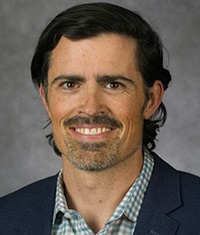 Lamont Black is an associate professor of finance in the Driehaus College of Business at DePaul University, Chicago, Illinois. Black is also the academic director of DePaul’s John L. Keeley Center for Financial Services. Prior to joining the faculty of DePaul, Black was an economist at the Federal Reserve Board of Governors in Washington, D.C. His main research interests are in the areas of banking, corporate finance and macroeconomics. His research has been published in numerous journals, including the Review of Financial Studies; the Journal of Money, Credit and Banking; and the Journal of Banking and Finance. Black teaches money, banking, and capital markets to undergraduate and graduate students. He received a Ph.D. in Finance, as well as his Ph.D. in Economics, from the Kelley School of Business at Indiana University. He received his bachelor's degree in Modern Thought and Literature from Stanford University.
Lamont Black is an associate professor of finance in the Driehaus College of Business at DePaul University, Chicago, Illinois. Black is also the academic director of DePaul’s John L. Keeley Center for Financial Services. Prior to joining the faculty of DePaul, Black was an economist at the Federal Reserve Board of Governors in Washington, D.C. His main research interests are in the areas of banking, corporate finance and macroeconomics. His research has been published in numerous journals, including the Review of Financial Studies; the Journal of Money, Credit and Banking; and the Journal of Banking and Finance. Black teaches money, banking, and capital markets to undergraduate and graduate students. He received a Ph.D. in Finance, as well as his Ph.D. in Economics, from the Kelley School of Business at Indiana University. He received his bachelor's degree in Modern Thought and Literature from Stanford University.
 Richard A. Brown concurrently serves as the Federal Deposit Insurance Corp.’s (FDIC) chief economist and as associate director in the FDIC’s Division of Insurance and Research. As chief economist, he is responsible for developing and communicating the FDIC’s perspective on a wide range of economic and risk-management issues. Brown speaks often on the economy to bankers and trade groups and has been interviewed by the Wall Street Journal, Fortune, Business Week, CNBC and other media outlets. Prior to coming to the FDIC in 1990, Brown held research positions at the Resolution Trust Corp., the Federal Savings and Loan Insurance Corp. and the Federal Home Loan Bank Board. Brown completed a doctorate in economics at the George Washington University and received a bachelor’s degree in economics from the University of Cincinnati.
Richard A. Brown concurrently serves as the Federal Deposit Insurance Corp.’s (FDIC) chief economist and as associate director in the FDIC’s Division of Insurance and Research. As chief economist, he is responsible for developing and communicating the FDIC’s perspective on a wide range of economic and risk-management issues. Brown speaks often on the economy to bankers and trade groups and has been interviewed by the Wall Street Journal, Fortune, Business Week, CNBC and other media outlets. Prior to coming to the FDIC in 1990, Brown held research positions at the Resolution Trust Corp., the Federal Savings and Loan Insurance Corp. and the Federal Home Loan Bank Board. Brown completed a doctorate in economics at the George Washington University and received a bachelor’s degree in economics from the University of Cincinnati.

James Bullard is the president and CEO of the Federal Reserve Bank of St. Louis. In that role, he is a participant on the Federal Reserve’s Federal Open Market Committee (FOMC), which meets regularly to set the direction of U.S. monetary policy. He also oversees the Federal Reserve’s Eighth District, including activities at the St. Louis headquarters and its branches in Little Rock, Arkansas, Louisville, Kentucky, and Memphis, Tennessee. A noted economist and policymaker, Bullard makes Fed transparency and dialogue a priority on the international and national stage as well as on Main Street. He serves on the board of directors of the St. Louis Regional Chamber and the board of directors of Concordance Academy of Leadership, and he is a past board chair of the United Way U.S.A. Bullard is co-editor of the Journal of Economic Dynamics and Control, and a member of the Central Bank Research Association’s senior council. He is an honorary professor of economics at Washington University in St. Louis, where he also sits on the advisory council of the economics department and the advisory board of the Center for Dynamic Economics. A native of Forest Lake, Minnesota, Bullard received his doctorate in economics from Indiana University in Bloomington.
 Ken B. Cyree is the dean and the Frank R. Day/Mississippi Bankers Association Chair of Banking at the University of Mississippi School of Business Administration, where he is also a professor of finance. Cyree received his doctorate and his Master of Business Administration from the University of Tennessee. He is the director of the Mississippi School of Banking and a faculty member at the Graduate School of Banking at Louisiana State University. Cyree’s research interests are in banking, financial markets, interest rates and regulation. He has papers published in the Journal of Business, Financial Management, the Journal of Banking and Finance, the Journal of Financial Research, the Journal of Financial Services Research, the Journal of Financial Markets, the Financial Review, along with several other academic journals. In addition, Cyree has served on the editorial board of the Journal of Business Research and is currently an associate editor at the Journal of Financial Research. He is past president of the Southern Finance Association and served on the nominating committee for the Eastern Finance Association. Cyree was named the University of Mississippi School of Business Administration’s “Outstanding Teacher of the Year” in 2007 and “Outstanding Senior Researcher” in 2014.
Ken B. Cyree is the dean and the Frank R. Day/Mississippi Bankers Association Chair of Banking at the University of Mississippi School of Business Administration, where he is also a professor of finance. Cyree received his doctorate and his Master of Business Administration from the University of Tennessee. He is the director of the Mississippi School of Banking and a faculty member at the Graduate School of Banking at Louisiana State University. Cyree’s research interests are in banking, financial markets, interest rates and regulation. He has papers published in the Journal of Business, Financial Management, the Journal of Banking and Finance, the Journal of Financial Research, the Journal of Financial Services Research, the Journal of Financial Markets, the Financial Review, along with several other academic journals. In addition, Cyree has served on the editorial board of the Journal of Business Research and is currently an associate editor at the Journal of Financial Research. He is past president of the Southern Finance Association and served on the nominating committee for the Eastern Finance Association. Cyree was named the University of Mississippi School of Business Administration’s “Outstanding Teacher of the Year” in 2007 and “Outstanding Senior Researcher” in 2014.
 Candace A. Franks is the Arkansas State Bank Commissioner, overseeing the Arkansas State Bank Department. The bank department is the chartering and regulatory authority for state banks that have main offices in Arkansas. Franks is also serving a one-year term as chairman of the board of directors of the Conference of Bank Supervisors. From 1995 until her appointment as commissioner in 2007, Franks served as deputy bank commissioner and general counsel for the bank department. Previously, Franks served as general counsel to the bank department and represented the State Banking Board. In 2010, she was recognized by Arkansas Business as one of 20 "Women of Influence,” and as one of the "Top 100 Women in Arkansas” in 1996, 1997 and 1998. Franks received her Juris Doctor from the University of Arkansas at Little Rock in 1979 and her Bachelor of Arts in history and Master of Arts in American history from Arkansas State University at Jonesboro.
Candace A. Franks is the Arkansas State Bank Commissioner, overseeing the Arkansas State Bank Department. The bank department is the chartering and regulatory authority for state banks that have main offices in Arkansas. Franks is also serving a one-year term as chairman of the board of directors of the Conference of Bank Supervisors. From 1995 until her appointment as commissioner in 2007, Franks served as deputy bank commissioner and general counsel for the bank department. Previously, Franks served as general counsel to the bank department and represented the State Banking Board. In 2010, she was recognized by Arkansas Business as one of 20 "Women of Influence,” and as one of the "Top 100 Women in Arkansas” in 1996, 1997 and 1998. Franks received her Juris Doctor from the University of Arkansas at Little Rock in 1979 and her Bachelor of Arts in history and Master of Arts in American history from Arkansas State University at Jonesboro.
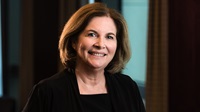 Esther L. George is president and CEO of the Federal Reserve Bank of Kansas City and a member of the Federal Open Market Committee, which sets U.S. monetary policy. She has more than 30 years of experience at the Kansas City Fed, primarily focused on regulatory oversight of 170 state-chartered banks and nearly 1,000 bank and financial holding companies in seven states. George was directly involved in the banking supervision and discount window lending activities during the banking crisis of the 1980s and post-9/11. During the most recent financial crisis, she served as the acting director of the Federal Reserve’s Division of Banking Supervision and Regulation in Washington, D.C. She is a native of Faucett, Mo.
Esther L. George is president and CEO of the Federal Reserve Bank of Kansas City and a member of the Federal Open Market Committee, which sets U.S. monetary policy. She has more than 30 years of experience at the Kansas City Fed, primarily focused on regulatory oversight of 170 state-chartered banks and nearly 1,000 bank and financial holding companies in seven states. George was directly involved in the banking supervision and discount window lending activities during the banking crisis of the 1980s and post-9/11. During the most recent financial crisis, she served as the acting director of the Federal Reserve’s Division of Banking Supervision and Regulation in Washington, D.C. She is a native of Faucett, Mo.
 Zhaozhao He is a fourth-year doctoral student in finance at the University of Kansas School Of Business. Her current research interests include corporate cash management, financial intermediaries, innovation, and product market interactions. In 2014, she received a Western Finance Association Ph.D. Candidate Award for Outstanding Research. Her research has received the McGraw-Hill/Irwin Distinguished Paper Award and the Outstanding Doctoral Student Paper Award at the 2014 Southwestern Finance Association’s annual meeting. She graduated with honors from the Shanghai Institute of Foreign Trade and received a Master of Business Administration from the University of Central Arkansas.
Zhaozhao He is a fourth-year doctoral student in finance at the University of Kansas School Of Business. Her current research interests include corporate cash management, financial intermediaries, innovation, and product market interactions. In 2014, she received a Western Finance Association Ph.D. Candidate Award for Outstanding Research. Her research has received the McGraw-Hill/Irwin Distinguished Paper Award and the Outstanding Doctoral Student Paper Award at the 2014 Southwestern Finance Association’s annual meeting. She graduated with honors from the Shanghai Institute of Foreign Trade and received a Master of Business Administration from the University of Central Arkansas.
 J. Pat Hickman is chairman and CEO of Happy State Bank & Trust Company, domiciled in Happy, Texas (The Town Without a Frown). He has held these positions for the past 24 years and has led his bank from the 812th largest bank ($10 million total assets) in Texas in 1990 to the 25th largest bank (more than $2.5 billion total assets). The bank also owns GoldStar Trust Company, which does business in all 50 states and is the largest trustee in the nation for self-directed precious metal individual retirement accounts. A banker for 40 years, Hickman has served as a board member and chair of several community and banking organizations, including past chair of the Independent Bankers Association of Texas. He attended Texas Tech University and West Texas A&M University.
J. Pat Hickman is chairman and CEO of Happy State Bank & Trust Company, domiciled in Happy, Texas (The Town Without a Frown). He has held these positions for the past 24 years and has led his bank from the 812th largest bank ($10 million total assets) in Texas in 1990 to the 25th largest bank (more than $2.5 billion total assets). The bank also owns GoldStar Trust Company, which does business in all 50 states and is the largest trustee in the nation for self-directed precious metal individual retirement accounts. A banker for 40 years, Hickman has served as a board member and chair of several community and banking organizations, including past chair of the Independent Bankers Association of Texas. He attended Texas Tech University and West Texas A&M University.
 Julie Andersen Hill is an associate professor of law at the University of Alabama, where she teaches and writes about banking and commercial law. Her scholarship often focuses on the unwritten rules of financial institution regulatory enforcement. Before entering the legal academy, Hill practiced law in the Washington, D.C., office of Skadden, Arps, Slate, Meagher, & Flom LLP. As part of the litigation group, she represented large financial institutions under government investigation. Before practicing law, she worked at two small community banks. She received her Bachelor of Science in economics from Southern Utah University and her Juris Doctor from Brigham Young University.
Julie Andersen Hill is an associate professor of law at the University of Alabama, where she teaches and writes about banking and commercial law. Her scholarship often focuses on the unwritten rules of financial institution regulatory enforcement. Before entering the legal academy, Hill practiced law in the Washington, D.C., office of Skadden, Arps, Slate, Meagher, & Flom LLP. As part of the litigation group, she represented large financial institutions under government investigation. Before practicing law, she worked at two small community banks. She received her Bachelor of Science in economics from Southern Utah University and her Juris Doctor from Brigham Young University.
 Yan Lee is a senior financial economist in the Center for Financial Research at the FDIC. She received her doctorate in economics in 2005 from the University of California-Los Angeles, with a specialization in labor and applied micro. Prior to graduate studies, she attended Barnard College at Columbia University, and was employed at the Federal Reserve Bank of New York. Lee’s research interests include crime, homeownership and entrepreneurship.
Yan Lee is a senior financial economist in the Center for Financial Research at the FDIC. She received her doctorate in economics in 2005 from the University of California-Los Angeles, with a specialization in labor and applied micro. Prior to graduate studies, she attended Barnard College at Columbia University, and was employed at the Federal Reserve Bank of New York. Lee’s research interests include crime, homeownership and entrepreneurship.
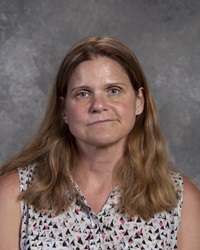
Traci Mach is a principal economist in the financial structure section of the Division of Research and Statistics at the Federal Reserve Board of Governors. She joined the Board of Governors staff in 2003. While at the Board, Mach has been involved in conducting economic analysis of issues relating to the household and small business finance, working extensively with the Board’s Survey of Small Business Finances and its Survey of Consumer Finances. Mach received her bachelor’s degree from Cornell College, Mt. Vernon, Iowa, and her Ph.D. in economics from The Ohio State University. Prior to joining the Federal Reserve Board, Mach served on the faculty of the economics department at the State University of New York at Albany.
 Tanya D. Marsh is an associate professor of law at Wake Forest University School of Law in Winston-Salem, N.C., where she teaches property; real estate transactions; a seminar on the regulation of financial institutions; funeral and cemetery law; and professional development. Her scholarship addresses the regulation of community banks, commercial real estate, and the laws regarding the status, treatment and disposition of human remains. She is a graduate of Indiana University and Harvard Law School. Prior to joining the Wake Forest faculty in 2010, Marsh practiced commercial real estate and corporate law in Indianapolis for 10 years. She is a member of the American College of Real Estate Lawyers and is involved in the leadership of the American Bar Association Section of Real Property Trust and Estate Law.
Tanya D. Marsh is an associate professor of law at Wake Forest University School of Law in Winston-Salem, N.C., where she teaches property; real estate transactions; a seminar on the regulation of financial institutions; funeral and cemetery law; and professional development. Her scholarship addresses the regulation of community banks, commercial real estate, and the laws regarding the status, treatment and disposition of human remains. She is a graduate of Indiana University and Harvard Law School. Prior to joining the Wake Forest faculty in 2010, Marsh practiced commercial real estate and corporate law in Indianapolis for 10 years. She is a member of the American College of Real Estate Lawyers and is involved in the leadership of the American Bar Association Section of Real Property Trust and Estate Law.
 Trey Maust is co-founder, co-president, CEO and board member of Lewis & Clark Bank in Oregon City, Ore. Maust began his career in Portland, Ore., where he conducted and managed financial statement audits, internal control assessments and Federal Deposit Insurance Corp. Improvement Act attestation engagements. He later transferred to Deloitte’s Merger and Acquisition Services group in New York City, where he was a national resource for bank acquisitions and for conducting financial and operational due diligence on more than 40 transactions in a variety of industries for both financial sponsors and strategic buyers. Prior to his current position, Maust served as chief financial officer at two Portland-area community banks. He is heavily involved in state and national banking associations, and is also on multiple advisory and fiduciary boards of both for-profit and nonprofit organizations. Maust received a bachelor’s degree in business administration from Portland State University and is a licensed certified public accountant. In 2007, he was recognized as one of the “40 under 40” by the Portland Business Journal.
Trey Maust is co-founder, co-president, CEO and board member of Lewis & Clark Bank in Oregon City, Ore. Maust began his career in Portland, Ore., where he conducted and managed financial statement audits, internal control assessments and Federal Deposit Insurance Corp. Improvement Act attestation engagements. He later transferred to Deloitte’s Merger and Acquisition Services group in New York City, where he was a national resource for bank acquisitions and for conducting financial and operational due diligence on more than 40 transactions in a variety of industries for both financial sponsors and strategic buyers. Prior to his current position, Maust served as chief financial officer at two Portland-area community banks. He is heavily involved in state and national banking associations, and is also on multiple advisory and fiduciary boards of both for-profit and nonprofit organizations. Maust received a bachelor’s degree in business administration from Portland State University and is a licensed certified public accountant. In 2007, he was recognized as one of the “40 under 40” by the Portland Business Journal.
 Andrew P. Meyer is a senior economist in the Community Bank Research and Outreach office of the Federal Reserve Bank of St. Louis. He received a doctorate in economics from Washington University in St. Louis and has worked at the Federal Reserve since 1994. In addition to his research on community banking issues, Meyer conducts statistical analysis of the downgrade and failure risk of commercial banks. He also serves on a committee to improve the Federal Reserve's off-site bank surveillance program and has taught regularly in examiner training schools.
Andrew P. Meyer is a senior economist in the Community Bank Research and Outreach office of the Federal Reserve Bank of St. Louis. He received a doctorate in economics from Washington University in St. Louis and has worked at the Federal Reserve since 1994. In addition to his research on community banking issues, Meyer conducts statistical analysis of the downgrade and failure risk of commercial banks. He also serves on a committee to improve the Federal Reserve's off-site bank surveillance program and has taught regularly in examiner training schools.
 Joshua Mitts is the Postdoctoral Fellow in Empirical Law and Economics at the Ira M. Millstein Center for Global Markets and Corporate Ownership at Columbia Law School. His research applies empirical methods to the study of contract and corporate law. Mitts has authored causal inference studies on the effect of legal interventions, applications of automated content analysis to legal research, and predictive analysis using large-scale textual data to guide regulatory policy. His scholarship has been published or is forthcoming in various journals including the Yale Law Journal, Cornell Law Review, Yale Journal on Regulation, Harvard Business Law Review, Delaware Journal of Corporate Law and the peer-reviewed Journal of Financial Regulation and has been presented at the annual meeting of the American Law & Economics Association and the Conference on Empirical Legal Studies.
Joshua Mitts is the Postdoctoral Fellow in Empirical Law and Economics at the Ira M. Millstein Center for Global Markets and Corporate Ownership at Columbia Law School. His research applies empirical methods to the study of contract and corporate law. Mitts has authored causal inference studies on the effect of legal interventions, applications of automated content analysis to legal research, and predictive analysis using large-scale textual data to guide regulatory policy. His scholarship has been published or is forthcoming in various journals including the Yale Law Journal, Cornell Law Review, Yale Journal on Regulation, Harvard Business Law Review, Delaware Journal of Corporate Law and the peer-reviewed Journal of Financial Regulation and has been presented at the annual meeting of the American Law & Economics Association and the Conference on Empirical Legal Studies.
 Jerome H. Powell took office as a member of the Board of Governors of the Federal Reserve System on May 25, 2012, to fill an unexpired term. He was reappointed and sworn in on June 16, 2014, for a term ending Jan. 31, 2028. Prior to his appointment, Powell was a visiting scholar at the Bipartisan Policy Center in Washington, D.C., where he focused on federal and state fiscal issues. From 1997 through 2005, Powell was a partner at The Carlyle Group. Powell served as an assistant secretary and as undersecretary of the Treasury under President George H.W. Bush, with responsibility for policy on financial institutions, the Treasury debt market and related areas. Prior to joining the administration, he worked as a lawyer and investment banker in New York City. He received an A.B. in politics from Princeton University in 1975 and earned a law degree from Georgetown University in 1979. While at Georgetown, he was editor-in-chief of the Georgetown Law Journal.
Jerome H. Powell took office as a member of the Board of Governors of the Federal Reserve System on May 25, 2012, to fill an unexpired term. He was reappointed and sworn in on June 16, 2014, for a term ending Jan. 31, 2028. Prior to his appointment, Powell was a visiting scholar at the Bipartisan Policy Center in Washington, D.C., where he focused on federal and state fiscal issues. From 1997 through 2005, Powell was a partner at The Carlyle Group. Powell served as an assistant secretary and as undersecretary of the Treasury under President George H.W. Bush, with responsibility for policy on financial institutions, the Treasury debt market and related areas. Prior to joining the administration, he worked as a lawyer and investment banker in New York City. He received an A.B. in politics from Princeton University in 1975 and earned a law degree from Georgetown University in 1979. While at Georgetown, he was editor-in-chief of the Georgetown Law Journal.
 Rebeca Romero Rainey is the chairman and CEO of Centinel Bank in Taos, N.M. She is a graduate of Wellesley College and the Pacific Coast School of Banking. Upon graduating from Wellesley, she returned to Taos with the dream of continuing her family business of running the town’s only local community bank. In 1999, she was promoted to president and CEO of the bank and is the third generation of her family to run the bank. Centinel Bank has $190 million in assets and maintains the market share of deposits in the community. Romero Rainey is a past president of the Independent Bankers Association of New Mexico and is currently vice chairman of the Independent Community Bankers Association. From 2009 thru 2012, she served two terms on the Federal Deposit Insurance Corp.’s Advisory Committee on Community Banking. In October 2011, she joined the Federal Reserve Bank of Kansas City’s Community Depository Institutions Advisory Council. She is actively involved in several local nonprofits. She currently is president and co-founder of the Bridges Project for Education, a nonprofit focused on helping first-generation college students, and is past president of the Northern New Mexico Birth Center. She is also on the board of the New Mexico Economic Partnership. In 2009, Romero Rainey was selected as “Taos Citizen of the Year,” and she has been awarded the New Mexico Governor’s Award for Outstanding Women.
Rebeca Romero Rainey is the chairman and CEO of Centinel Bank in Taos, N.M. She is a graduate of Wellesley College and the Pacific Coast School of Banking. Upon graduating from Wellesley, she returned to Taos with the dream of continuing her family business of running the town’s only local community bank. In 1999, she was promoted to president and CEO of the bank and is the third generation of her family to run the bank. Centinel Bank has $190 million in assets and maintains the market share of deposits in the community. Romero Rainey is a past president of the Independent Bankers Association of New Mexico and is currently vice chairman of the Independent Community Bankers Association. From 2009 thru 2012, she served two terms on the Federal Deposit Insurance Corp.’s Advisory Committee on Community Banking. In October 2011, she joined the Federal Reserve Bank of Kansas City’s Community Depository Institutions Advisory Council. She is actively involved in several local nonprofits. She currently is president and co-founder of the Bridges Project for Education, a nonprofit focused on helping first-generation college students, and is past president of the Northern New Mexico Birth Center. She is also on the board of the New Mexico Economic Partnership. In 2009, Romero Rainey was selected as “Taos Citizen of the Year,” and she has been awarded the New Mexico Governor’s Award for Outstanding Women.
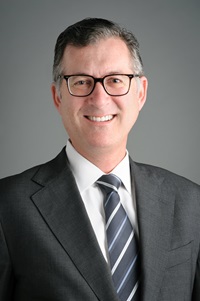
John W. Ryan is the president and CEO of the Conference of State Bank Supervisors, the national association representing state banking supervisors and the leading advocate for advancing the state banking system. Before being named CSBS president and CEO in August 2011, Ryan was CSBS's executive vice president, a position he had held since October 2003. He first joined CSBS in 1997 as an assistant vice president for legislative affairs. Prior to joining CSBS, Ryan worked at Newmyer Associates, a public affairs consulting firm, where he led the company's financial services consulting practice. Previous to his work at Newmyer Associates, Ryan spent four years as a professional staff member to the U.S. House of Representatives Committee on Banking, Finance and Urban Affairs. Ryan received a bachelor's degree in political science and economics from the University of California-Berkeley.
 Heidi Mandanis Schooner is a professor of law at the Columbus School of Law at The Catholic University of America. She has also been a visiting professor at Suffolk University Law School and at the George Washington University Law School and has served as a consultant to the International Monetary Fund and to various federal and state agencies. Before joining the law faculty at The Catholic University in 1993, she was acting general counsel of First American Metro Corp., a bank holding company. She also practiced in the Securities and Exchange Commission’s Office of the General Counsel and as an associate with a private law firm. Schooner’s scholarship examines both the domestic and international challenges in regulating the financial services industry. She recently co-authored a textbook on international bank regulation, Global Bank Regulation: Principles and Policies, with Michael W. Taylor. She teaches courses in banking law, corporations, contracts and commercial law. Schooner received her bachelor's degree with honors from Duke University and her Juris Doctor from the Georgetown University Law Center.
Heidi Mandanis Schooner is a professor of law at the Columbus School of Law at The Catholic University of America. She has also been a visiting professor at Suffolk University Law School and at the George Washington University Law School and has served as a consultant to the International Monetary Fund and to various federal and state agencies. Before joining the law faculty at The Catholic University in 1993, she was acting general counsel of First American Metro Corp., a bank holding company. She also practiced in the Securities and Exchange Commission’s Office of the General Counsel and as an associate with a private law firm. Schooner’s scholarship examines both the domestic and international challenges in regulating the financial services industry. She recently co-authored a textbook on international bank regulation, Global Bank Regulation: Principles and Policies, with Michael W. Taylor. She teaches courses in banking law, corporations, contracts and commercial law. Schooner received her bachelor's degree with honors from Duke University and her Juris Doctor from the Georgetown University Law Center.
 Mark Schroeder is chairman and CEO of Jasper, Ind.-based German American Bancorp Inc., a $2.2 billion bank holding company. Schroeder, who has served as German American’s CEO since 1999, previously served in numerous senior management positions with the company, including tenures as its chief operating officer, chief financial officer and chief lending officer. He also serves on the board of directors for German American Bancorp Inc. and its subsidiaries. Schroeder is firmly committed to the company’s vision of community banking and serves on various state and local banking organizations’ boards and committees, including the Indiana Department of Financial Institutions, the Independent Community Bankers of America and the Indiana Bankers Association. He serves as a member of the University of Evansville’s School of Business Advisory Board. Schroeder received a Bachelor of Science in Financial Management from the University of Evansville, and he is a graduate of the Stonier Graduate School of Banking. He is also a certified public accountant.
Mark Schroeder is chairman and CEO of Jasper, Ind.-based German American Bancorp Inc., a $2.2 billion bank holding company. Schroeder, who has served as German American’s CEO since 1999, previously served in numerous senior management positions with the company, including tenures as its chief operating officer, chief financial officer and chief lending officer. He also serves on the board of directors for German American Bancorp Inc. and its subsidiaries. Schroeder is firmly committed to the company’s vision of community banking and serves on various state and local banking organizations’ boards and committees, including the Indiana Department of Financial Institutions, the Independent Community Bankers of America and the Indiana Bankers Association. He serves as a member of the University of Evansville’s School of Business Advisory Board. Schroeder received a Bachelor of Science in Financial Management from the University of Evansville, and he is a graduate of the Stonier Graduate School of Banking. He is also a certified public accountant.
 R.H. (Hank) Seale III is an industry veteran who began his career as a loan payments teller for The Bank of the Hills, working his way up to vice president of operations. During that time, he was secretary and treasurer of the Young Bankers Division of the Independent Bankers Association of Texas. Following the acquisition of The Bank of the Hills, Seale co-founded Dallas-based Regency Voice Systems, a company that introduced voice banking to community banks and evolved into a multimillion-dollar business with more than 1,600 community bank customers. When Regency was acquired by Transaction Systems Architects Inc. in 1997, Seale went on to start Q UP Systems, a provider of technology to more than 700 community banks. He was a nominee and finalist for Ernst and Young’s “Entrepreneur of the Year” award in 1999. Q UP became part of the S1 Corporation in 2000, and Seale served as the CEO of S1’s Community and Regional Solutions group until 2001. Passionate about the financial services industry, he spends time creating and refining his vision for providing industry-leading technology solutions, along with superior customer service, to the community bank and credit union marketplace. Seale is an active entrepreneur and investor in multiple companies. He is a graduate of Texas Tech University.
R.H. (Hank) Seale III is an industry veteran who began his career as a loan payments teller for The Bank of the Hills, working his way up to vice president of operations. During that time, he was secretary and treasurer of the Young Bankers Division of the Independent Bankers Association of Texas. Following the acquisition of The Bank of the Hills, Seale co-founded Dallas-based Regency Voice Systems, a company that introduced voice banking to community banks and evolved into a multimillion-dollar business with more than 1,600 community bank customers. When Regency was acquired by Transaction Systems Architects Inc. in 1997, Seale went on to start Q UP Systems, a provider of technology to more than 700 community banks. He was a nominee and finalist for Ernst and Young’s “Entrepreneur of the Year” award in 1999. Q UP became part of the S1 Corporation in 2000, and Seale served as the CEO of S1’s Community and Regional Solutions group until 2001. Passionate about the financial services industry, he spends time creating and refining his vision for providing industry-leading technology solutions, along with superior customer service, to the community bank and credit union marketplace. Seale is an active entrepreneur and investor in multiple companies. He is a graduate of Texas Tech University.
 Joshua Siegel is managing partner and CEO of New York City-based StoneCastle Partners LLC, a national alternative asset manager with more than $8 billion in assets under management across eight funds for more than 1,000 institutional and high-net-worth clients. Founded by Siegel, StoneCastle has grown into one of the world’s largest and most successful investment firms focused on the banking industry, with more than 50 professionals operating from five locations. His research and financial innovations have brought nearly $40 billion of capital to more than 1,600 banks across the U.S. over the past 12 years. Siegel is widely regarded as a leading expert and investor in the community banking industry and speaks frequently at industry events, including those hosted by the American Bankers Association, Conference of State Bank Supervisors, the Federal Deposit Insurance Corp., the Federal Reserve and SNL Financial. A creative instructor with a passion for teaching, Siegel has regularly been invited to educate government regulators about the specialized community banking sector. He has also served as adjunct professor at the Columbia Business School in New York City. Prior to co-founding StoneCastle, Siegel was a co-founder and vice president of the Global Portfolio Solutions Group at Salomon Brothers/Citigroup Global Markets, a group organized to finance portfolios of financial assets for corporations and to invest in the sector as a principal. He later assumed responsibility for developing new products, including pooled investment strategies for the community banking sector. He originally joined Salomon Brothers/Citigroup in 1996 in the tax and lease division, providing structured financing to government-sponsored enterprises and Fortune 500 corporations. Prior to his tenure at Salomon Brothers/Citigroup, Joshua worked at Sumitomo Bank, where he served as a corporate lending officer, as a member of the New York Credit Committee and at the Charterhouse Group, where he carried out merchant banking and private equity transactions. Siegel received his Bachelor of Science in Management and Accounting from Tulane University.
Joshua Siegel is managing partner and CEO of New York City-based StoneCastle Partners LLC, a national alternative asset manager with more than $8 billion in assets under management across eight funds for more than 1,000 institutional and high-net-worth clients. Founded by Siegel, StoneCastle has grown into one of the world’s largest and most successful investment firms focused on the banking industry, with more than 50 professionals operating from five locations. His research and financial innovations have brought nearly $40 billion of capital to more than 1,600 banks across the U.S. over the past 12 years. Siegel is widely regarded as a leading expert and investor in the community banking industry and speaks frequently at industry events, including those hosted by the American Bankers Association, Conference of State Bank Supervisors, the Federal Deposit Insurance Corp., the Federal Reserve and SNL Financial. A creative instructor with a passion for teaching, Siegel has regularly been invited to educate government regulators about the specialized community banking sector. He has also served as adjunct professor at the Columbia Business School in New York City. Prior to co-founding StoneCastle, Siegel was a co-founder and vice president of the Global Portfolio Solutions Group at Salomon Brothers/Citigroup Global Markets, a group organized to finance portfolios of financial assets for corporations and to invest in the sector as a principal. He later assumed responsibility for developing new products, including pooled investment strategies for the community banking sector. He originally joined Salomon Brothers/Citigroup in 1996 in the tax and lease division, providing structured financing to government-sponsored enterprises and Fortune 500 corporations. Prior to his tenure at Salomon Brothers/Citigroup, Joshua worked at Sumitomo Bank, where he served as a corporate lending officer, as a member of the New York Credit Committee and at the Charterhouse Group, where he carried out merchant banking and private equity transactions. Siegel received his Bachelor of Science in Management and Accounting from Tulane University.
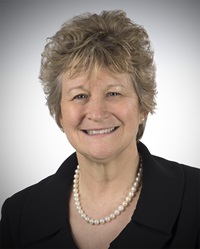
Julie Stackhouse is executive vice president and managing officer of supervision, credit, community development and learning innovation for the Federal Reserve Bank of St. Louis. Prior to joining the St. Louis Fed in September 2002, Stackhouse served as vice president and managing officer of the Risk Management department of the Federal Reserve Bank of Minneapolis. In addition, she was formerly an officer with the Federal Reserve Bank of Kansas City prior to relocating to Minnesota in 1995. She served in many capacities at the Kansas City Reserve Bank, starting as an examiner in 1980. Stackhouse holds a bachelor's degree in business administration from Drake University and is a graduate of the Wisconsin Graduate School of Banking. She currently serves as president-elect of the Board for National Charity League, Inc., a mother-daughter philanthropic organization, and as a member of the St. Louis Forum. In 2010, Stackhouse was named a St. Louis Business Journal “Most Influential Business Women” recipient, and in 2016, was recognized with the Delta Sigma Pi Lifetime Achievement Award.

Michael Stevens is the senior executive vice president at the Conference of State Bank Supervisors (CSBS). He is responsible for leading the organization's public policy, financial supervision, federal coordination, communications, industry relations and professional development functions. Stevens also serves as the principal deputy to the state banking member of the Financial Stability Oversight Council. Prior to his appointment in September 2011, he served as the senior vice president for regulatory policy, representing the state banking system in the development of policy in the areas of financial stability, prudential supervision and consumer protection. He joined CSBS in 1999 to work in all facets of CSBS's professional development division. Stevens is a frequent instructor and speaker on banking policy, examinations and financial analysis. He serves on the faculty of the Graduate School of Banking at Colorado and at Texas Tech University's School of Banking. He began his regulatory career as a bank examiner for the Iowa Division of Banking, where he served 11 years.
 David C. Williams is president and CEO of Upper Peninsula State Bank, headquartered in Escanaba, Mich. A native of Michigan's Upper Peninsula region, Williams is a 1983 graduate of Michigan Technological University and holds a Bachelor of Science in business management and finance. He began his career at Houghton National Bank in Houghton, Mich. His early mentor was Houghton’s president and CEO, Alexander Sample, whom Williams first met while doing a research paper on banking during college. To broaden and augment his banking experience, his early career included several years with Old Kent Bank in Grand Rapids, Mich., and with Republic Bank which had offices in Michigan and in Cleveland, Ohio. In 1995, he joined Hancock, Mich.-based D&N Bank and ran its Upper Peninsula region, which included 14 offices and approximately $450 million in deposits. He has served as president and CEO of Upper Peninsula State Bank for the past 15 years. His background is diverse in all areas of banking with an emphasis in lending and in particular, commercial and industrial credit relationships.
David C. Williams is president and CEO of Upper Peninsula State Bank, headquartered in Escanaba, Mich. A native of Michigan's Upper Peninsula region, Williams is a 1983 graduate of Michigan Technological University and holds a Bachelor of Science in business management and finance. He began his career at Houghton National Bank in Houghton, Mich. His early mentor was Houghton’s president and CEO, Alexander Sample, whom Williams first met while doing a research paper on banking during college. To broaden and augment his banking experience, his early career included several years with Old Kent Bank in Grand Rapids, Mich., and with Republic Bank which had offices in Michigan and in Cleveland, Ohio. In 1995, he joined Hancock, Mich.-based D&N Bank and ran its Upper Peninsula region, which included 14 offices and approximately $450 million in deposits. He has served as president and CEO of Upper Peninsula State Bank for the past 15 years. His background is diverse in all areas of banking with an emphasis in lending and in particular, commercial and industrial credit relationships.
 Arthur E. Wilmarth Jr. is a professor of law at the George Washington University Law School. Prior to joining GW Law School's faculty in 1986, he was a partner in the Washington, D.C., office of Jones Day. Wilmarth teaches courses in banking law, contracts, corporations and American constitutional history. From 2011 to 2014, he served as executive director of GW Law School’s Center for Law, Economics and Finance (C-LEAF), and he has been a member of C-LEAF’s executive board since the center was founded in 2009. In 2010, he was a consultant to the Financial Crisis Inquiry Commission, the body established by Congress to report on the causes of the financial crisis of 2007-09. Wilmarth is the author of more than 30 articles and book chapters in the fields of banking law and American constitutional history, and he is co-editor of a book on the financial crisis. In 2005, the American College of Consumer Financial Services Lawyers awarded him its prize for the best law review article published in the field of consumer financial services law during the previous year. Wilmarth is a member of the editorial board of the Journal of Banking Regulation. He is also a member of the advisory board of the American Antitrust Institute. Wilmarth received his bachelor's degree from Yale University and his Juris Doctor from Harvard University.
Arthur E. Wilmarth Jr. is a professor of law at the George Washington University Law School. Prior to joining GW Law School's faculty in 1986, he was a partner in the Washington, D.C., office of Jones Day. Wilmarth teaches courses in banking law, contracts, corporations and American constitutional history. From 2011 to 2014, he served as executive director of GW Law School’s Center for Law, Economics and Finance (C-LEAF), and he has been a member of C-LEAF’s executive board since the center was founded in 2009. In 2010, he was a consultant to the Financial Crisis Inquiry Commission, the body established by Congress to report on the causes of the financial crisis of 2007-09. Wilmarth is the author of more than 30 articles and book chapters in the fields of banking law and American constitutional history, and he is co-editor of a book on the financial crisis. In 2005, the American College of Consumer Financial Services Lawyers awarded him its prize for the best law review article published in the field of consumer financial services law during the previous year. Wilmarth is a member of the editorial board of the Journal of Banking Regulation. He is also a member of the advisory board of the American Antitrust Institute. Wilmarth received his bachelor's degree from Yale University and his Juris Doctor from Harvard University.
 Timothy K. Zimmerman has served as president and CEO of Monroe, Penn.-based Standard Bank since 1992 and as a director since 1993. He has more than 30 years of experience in the financial services industry. Prior to joining Standard Bank, Zimmerman served at Landmark Savings Association, Pittsburgh (and its predecessors) from 1977 to 1992, including service as senior vice president and chief financial officer from 1985 to 1992. He is a certified public accountant and worked for KPMG Peat Marwick from 1973 to 1977. Zimmerman is very active in community organizations and volunteer boards of directors. He has served as a director and committee chairman and member of numerous not-for-profit organizations in the greater Pittsburgh area. He is a former member of the board of directors of the Pennsylvania Association of Community Bankers and is immediate past chairman of its Strategic Planning Committee. He is currently serving as secretary of the executive committee of Independent Community Bankers of America (ICBA) and as a member of ICBA’s Housing Policy Task Force, He is the executive committee liaison to ICBA’s Education Committee. He is currently chairman of the Consumer Financial Protection Bureau’s Community Bank Advisory Council and is a member of the National Association of Home Builders Mortgage Roundtable. Zimmerman is immediate past liaison to ICBA’s Federal Home Loan Bank Task Force, as well as the task force’s former chairman.
Timothy K. Zimmerman has served as president and CEO of Monroe, Penn.-based Standard Bank since 1992 and as a director since 1993. He has more than 30 years of experience in the financial services industry. Prior to joining Standard Bank, Zimmerman served at Landmark Savings Association, Pittsburgh (and its predecessors) from 1977 to 1992, including service as senior vice president and chief financial officer from 1985 to 1992. He is a certified public accountant and worked for KPMG Peat Marwick from 1973 to 1977. Zimmerman is very active in community organizations and volunteer boards of directors. He has served as a director and committee chairman and member of numerous not-for-profit organizations in the greater Pittsburgh area. He is a former member of the board of directors of the Pennsylvania Association of Community Bankers and is immediate past chairman of its Strategic Planning Committee. He is currently serving as secretary of the executive committee of Independent Community Bankers of America (ICBA) and as a member of ICBA’s Housing Policy Task Force, He is the executive committee liaison to ICBA’s Education Committee. He is currently chairman of the Consumer Financial Protection Bureau’s Community Bank Advisory Council and is a member of the National Association of Home Builders Mortgage Roundtable. Zimmerman is immediate past liaison to ICBA’s Federal Home Loan Bank Task Force, as well as the task force’s former chairman.
Video Gallery

